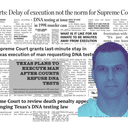
In a dissenting opinion in Glossip v. Gross, Justice Stephen Breyer (pictured), joined by Justice Ruth Bader Ginsburg, provided a sweeping analysis of why he believes the death penalty in the United States may be unconstitutional and called for a “full briefing” on “whether the death penalty violates the Constitution.” Justice Breyer wrote that “Nearly 40 years ago, this Court upheld the death penalty under statutes that, in the Court’s view, contained safeguards sufficient to ensure that the penalty would be applied reliably and not arbitrarily.… The circumstances and the evidence of the death penalty’s application have changed radically since then.” Justice Breyer said “those changes, taken together with my own 20 years of experience on this Court, … lead me to believe that the death penalty, in and of itself, now likely constitutes a legally prohibited ‘cruel and unusual punishmen[t].’” Citing DPIC’s resources for many of the historical facts underlying his opinion, Justice Breyer catalogued what he described as “three fundamental constitutional defects” in the administration of the death penalty today that may make it cruel and unusual punishment.
First, he said, the death penalty is cruel because of its “serious unreliability,” as evidenced by “convincing evidence … that innocent people have been executed” and “striking” evidence that “it has been wrongly imposed” on more than 100 innocent men and women, with a greater likelihood of wrongful conviction than in non-capital cases. He pointed to factors such as public pressure to obtain a conviction, distortions in the jury selection process, flawed forensic testimony, and official misconduct as contributing factors in these wrongful capital convictions. Second, he said the death penalty is cruel because it is arbitrarily imposed, failing to meaningfully distinguish between the worst of the worst crimes and killers while at the same being improperly influenced by factors relating to race, gender, geography, disparities in the exercise of prosecutorial discretion, insufficient resources to represent capitally charged inmates, and political pressures on elected judges. Third, Justice Breyer said the death penalty is cruel because it suffers from “unconscionably long delays that undermine the death penalty’s penological purpose.” Although extended appeals are necessary to exonerate the innocent and to assure the fairness and reliability of capital proceedings, the result is that death sentences are not carried out for decades, if at all, undermining any retributive or deterrent value the death penalty may have, with the dehumanizing harsh conditions of death row solitary confinement creating its own set of constitutional issues. Finally, Justice Breyer wrote, the death penalty is “unusual” because “most places within the United States have abandoned its use.” “30 States have either formally abolished the death penalty or have not conducted an execution in more than eight years,” he wrote, and executions are “a fairly rare event” in nine others, with three states accounting for 80% of all executions in 2014. Justice Breyer pointed to the “consistency of the direction of change” away from the death penalty, including repeal of death penalty statutes and downward trends in executions and death sentences. Finding it “highly likely that the death penalty violates the Eighth Amendment,” Justice Breyer called “[at the very least … for full briefing on the basic question.” For coverage and commentary on the Glossip decision, click here. For excerpts from the dissent, with links to the DPIC resources cited, click here.



